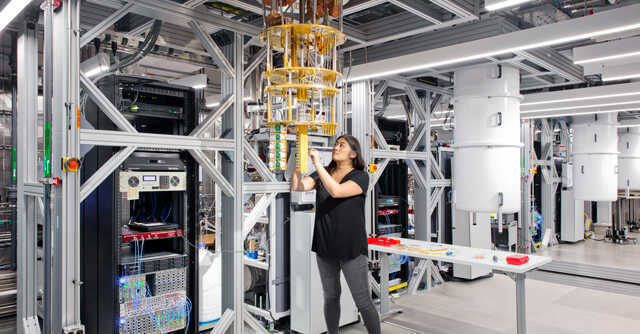
Inside India’s Quest to Ride the Quantum Wave


If India achieves its target of about 30 million electric vehicles in the next two years, it will also need many more electric charging stations. But how does one identify the best location for these stations? Should they be placed at existing gas stations, malls, or metro stations?
Given the million possibilities, Jitesh Lalwani, founder and CEO of Artificial Brain Tech Inc., believes quantum computing can provide the answers. His company, based in the US and Pune, has developed an algorithm that leverages the power of quantum computing accessed via cloud.
“The algorithm solves this problem by considering the point of interest and already existing electric charging locations and then optimally placing new charging points to cover as many people as possible,” says Lalwani.

But why not use high-performance computers (HPCs) for the task? HPCs process data and perform complex calculations at high speeds. “These are very complex problems that classical computers (conventional ones we use in our everyday lives such as laptops, desktops, and even HPCs) are not capable of solving. And even if they do, it will take them millions of years,” he explains.
Lalwani claims his company’s quantum algorithm returns result from an actual quantum computer in less than three seconds for 8543811434435330 (8.5 * 10^15) combinations.
Artificial Brain now plans to modify this quantum algorithm to find optimal locations for wind and solar farms, too.

Chennai-based Quantica Computacao is another company that’s betting on quantum computing. It aims to develop quantum cryptographic tools to help protect banking transactions. It is also working on quantum machine learning (ML) and artificial intelligence (AI) tools to help researchers accelerate their algorithms.
These two startups underline that quantum computing is no longer an esoteric science confined to research labs—it is beginning to find business applications. More of this later. First, let’s demystify the quantum computer.
The science

The computers we see and use in our homes and offices today process information with bits (ones and zeroes). They are referred to as classical or conventional computers. Quantum computers, on the other hand, use quantum bits or qubits that can process the ones and zeroes simultaneously due to a property known as superposition which allows them to process a lot more information than traditional computers. In October 2019, Google said it had performed a calculation on a quantum processor in 300 seconds that would have been practically impossible to achieve with the algorithms available at the time. The report was published in Nature magazine.
Quantum computing also rides on ‘quantum entanglement’, a property that Albert Einstein referred to as “spooky action at a distance” since it allows quantum particles to connect regardless of their location in the universe.
On 27 January, scientists from two premier Ahmedabad-based laboratories of the Department of Space—the Space Applications Centre and Physical Research Laboratory—jointly demonstrated quantum entanglement with realtime Quantum Key Distribution (QKD) between two buildings separated by a distance of 300 metres. QKD allows any two parties to generate random secret keys that can be shared exclusively to encrypt and decrypt messages. This makes the communication very secure, especially vital for defence and strategic agencies across the globe.

Read the full story on Mint.
